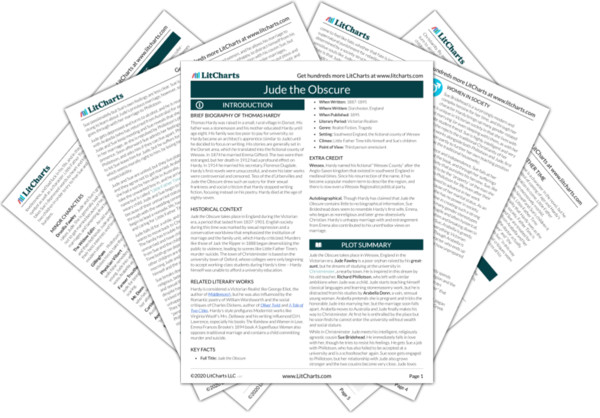Summary
Analysis
They return to their room and Sue is in a deep depression, looking out the window at Sarcophagus College and wondering at the strength of Jude’s dream that he should have brought them to dreary, unfriendly Christminster. Little Father Time is also upset, and he worries about where they will stay the next day.
Hardy unsubtly names one of his fictional colleges “Sarcophagus” – a stone coffin. This alludes to the earlier Biblical quote about “whited sepulchres,” as Hardy is basically saying Christminster is a pretty place filled with dead ideas.
Themes
Little Father Time questions Sue about life, and she affirms that everything is trouble and suffering. She says it would almost be better to not be born than to live in such a cruel world. Little Father Time asks if they can’t find a room because of the children’s presence, and Sue doesn’t object. Sue tells him that she is pregnant, and Little Father time grows angry and distressed, as the family is in such dire straits already. Before going to bed Little Father Time says “If we children was gone there’d be no trouble at all!”
In her own depression Sue talks to Little Father Time as if he was an adult. She gives voice to all of Hardy’s most pessimistic, depressed sentiments and Little Father Time absorbs them without any age or wisdom to put them in perspective. The theme of fate seems to culminate here, as the novel’s climax is set up by such a dreary worldview.
Themes
Sue wakes up early the next morning and goes to find Jude, who has found a passable inn. They have a quick breakfast together and then return to Sue’s lodgings. They make breakfast for the children, who seem to still be sleeping, and then Sue goes to wake them. Jude hears her shriek and he rushes in. Sue has fainted and the children are gone. Jude opens the closet door and finds all three children dead, hanging from clothes hooks. An overturned chair is near Little Father Time’s feet.
Little Father Time’s hanging of the children and then himself is the novel’s terrible climax, and takes the story’s tragedy to a new level. Jude and Sue have been so wrapped up in their own problems that they didn’t realize how their depression and society’s injustice was affecting their children. It is significant that because of Victorian morals Hardy can describe such a gruesome death in the novel but cannot ever explicitly mention sex or pregnancy.
Themes
Literary Devices
Jude immediately cuts the children down and lays them on the bed, and then he runs off to find a doctor. When he returns he finds Sue and the landlady trying to revive the children, but they are all dead. On the floor they find a note from Little Father Time saying “Done because we are too menny.” Sue feels that this is her fault and she breaks down into “convulsive agony.” They put her to bed and the landlady tries to comfort her.
This disaster is the turning point for Jude and Sue. Before this they still had potential to make their way in the world and find a place for themselves, but now Sue will be emotionally broken by the tragedy and lose all faith in her own judgment.
Themes
Get the entire Jude the Obscure LitChart as a printable PDF.

Jude talks to the doctor and then informs Sue that there is no hope for the children. The doctor had said that it was in Little Father Time’s “nature” to commit this act, and acts like this have been springing up among the next generation. He said it is the “beginning of the coming universal wish not to live.” Then Jude too breaks down.
They go to see the children’s bodies, and on Little Father Time’s face they seem to see the expression and condensation of all Jude’s bad luck and failures. They hear an organ in a nearby church playing “Truly God is loving unto Israel.” Sue breaks down again and declares that there seems to be an external force punishing them for trying to live in their own way.
Sue weeps and tells Jude about her conversation with Little Father Time the night before. She feels that her relationship with Jude is now “stained with blood,” and she regrets all her rebellious thoughts of the past. She remembers how they sought to “make a virtue of joy” and follow only Nature’s law, but surely they are now being punished for that. Jude quotes from the play Agamemnon, by Aeschylus: “Things are as they are.”
The nature of the tragedy would be enough to make anyone break down, but Hardy has already made Sue into an emotional, sensitive character, so her grief totally breaks her intellect and judgment. With the childrens’ death Hardy shows how Sue and Jude’s experiment in unmarried love also failed – until society changes, there is no good solution to the problem of marriage. Agamemnon concerns a cursed family (part of the house of Atreus).
Themes
Literary Devices
Sue stays in bed while the children are buried, but she appears at the burial’s end and frantically tries to uncover the coffins. Sue weeps, begging to see her children one last time, but Jude shepherds her home. That night Sue gives birth to a premature, stillborn baby.
Hardy keeps adding on more tragedy, burying the characters in death and grief. Sue and Jude harmed no one and tried only to “live in their own way,” but they have been punished for this with horror upon horror.
Themes












